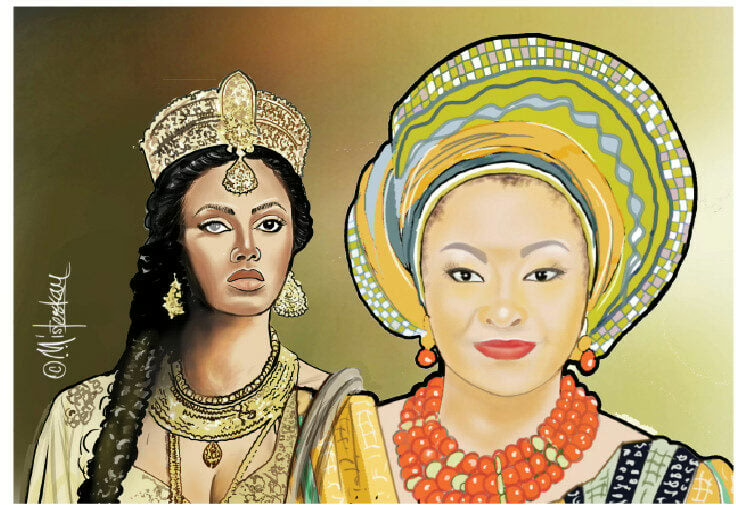The Book of Esther in the Bible recounts the story of Queen Vashti, spouse of King Xerxes of Persia. During a lavish feast filled with intoxicated nobles and courtiers, the king commanded Vashti to appear before the guests, adorned with her royal crown, to showcase her beauty.
Scholars have long pondered the king’s true intent behind this demand, but the essential truth remains: Vashti was summoned not as a partner or equal, but as an object for display. She was to be exhibited for the amusement of men, her dignity disregarded and reduced solely to her physical appearance. Vashti, however, refused to comply.
Through this bold act of resistance, Vashti rejected being objectified and reclaimed her personhood in a society bent on commodifying her femininity. Yet, her defiance came with repercussions. The male leaders, fearing her example might inspire other women, conspired to punish her. They dethroned her, exiled her from the palace, and codified laws reinforcing male dominance over wives-and by extension, over all women.
For these men, Vashti’s refusal was not merely a personal affront but a political challenge. It symbolized the potential awakening of women everywhere to their right to reject humiliation, oppose objectification normalized by men, and stand against systemic injustice.
Fast forward to modern Nigeria, where a similar narrative unfolded within the halls of the Senate. Senator Natasha Akpoti-Uduaghan from Kogi Central faced political backlash, suspension, and a calculated campaign to silence her after accusing Senate President Godswill Akpabio of sexual harassment. Instead of allowing a fair investigation, the Senate swiftly suspended her, weaponizing institutional authority to suppress her voice and implicitly warning other women against confronting entrenched power.
Much like Queen Vashti, Senator Akpoti-Uduaghan stood firm, refusing to be diminished, and endured the consequences of saying “no.” Her courage now serves as a beacon of empowerment for Nigerian women nationwide.
Patriarchy Intertwined with Religion and Culture Across Ages
Both ancient Persia and present-day Nigeria reveal how religion, politics, and cultural norms are manipulated to uphold patriarchal dominance. Vashti’s defiance was portrayed as a threat to divine and societal order, with her exile framed as a moral necessity. Similarly, Nigerian women who raise their voices are often reminded of “cultural traditions,” “religious duties,” or “customary expectations” that demand female silence, submission, and modesty.
Yet, the scriptures themselves celebrate Vashti’s bravery as the catalyst for a larger narrative of female resilience. Without her stand, Esther’s later intervention to save her people might never have been possible. Though Vashti’s resistance was suppressed by the men of her era, it became the hidden foundation of a story about liberation.
In Nigeria, every attempt to silence Senator Akpoti-Uduaghan has paradoxically amplified her message. What was intended to shame her has instead highlighted the urgent need for transparency and justice within political institutions.
Religious and cultural rhetoric in Nigeria often serves a dual purpose: elevating women as paragons of virtue while simultaneously denying them autonomy. Women are revered as caregivers, moral anchors, and nurturers, yet when they enter political or economic spheres, they face hostility, suspicion, and character attacks. This explains the swift and harsh backlash they often endure.
Enforcement of Patriarchy Through Political Power
The suspension and targeting of Senator Akpoti-Uduaghan transcend a personal conflict; they exemplify how institutional power is wielded to maintain patriarchal control. Political bodies frequently act as gatekeepers, ensuring that women’s participation demands silence and conformity.
Although Nigerian law guarantees equal rights for women, legal equality often conceals ongoing disparities in power and repercussions. With only four women among 109 senators, any woman challenging the status quo faces heightened vulnerability.
Ironically, in a nation grappling with corruption, insecurity, and poverty, the Senate prioritized disciplining a woman who accused a powerful man over addressing these critical issues. This selective use of authority reveals how political institutions protect male privilege rather than uphold justice or effective governance.
Her experience also exposes the intersection of patriarchy and politics. Control is not just exerted by individual men but reinforced by entire systems-legislative bodies, political parties, and media networks-that collaborate to preserve existing power structures.
Women who resist patriarchal norms risk more than losing their positions; they face reputational harm, threats, isolation, and sometimes physical danger. Yet, their defiance also sows the seeds of transformation. Vashti’s refusal inspired Esther’s bravery, and Akpoti-Uduaghan’s stand has encouraged a new wave of Nigerian women to engage in politics boldly, demand accountability, and reject silence.
Patriarchy thrives on narratives that glorify male dominance, label women’s resistance as deviance, and erase the contributions of courageous women. One of the most revolutionary acts we can undertake is to rewrite these stories.
Rather than remembering Vashti solely as the queen who lost her crown, we should honor her as the first woman in scripture to publicly resist objectification. Instead of dismissing Senator Akpoti-Uduaghan as a “disruptive senator,” we must enshrine her legacy as a trailblazer who challenged legislative authority.
By reshaping these narratives, we deny patriarchy the triumph of erasure, preserve the memory of resistance, and build a heritage of courage for future generations.
Building a Culture of Responsibility and Justice
Advancing accountability demands a collective transformation. It calls for men willing to relinquish patriarchal privileges, women united in solidarity refusing to let any woman’s defiance be dismissed as a solitary struggle, and citizens who insist that governance serve the public interest rather than self-preservation.
The bravery to say “no” to injustice is a radical act within any patriarchal framework and marks the beginning of liberation. Vashti lost her crown but preserved her dignity. Akpoti-Uduaghan faced suspension but retains her voice, conviction, and legislative role.
As a society, we must decide whether to continue punishing women for their resistance or dismantle the systems that make such defiance necessary. The future of our democracy, culture, and humanity hinges on this choice.
Vashti’s story teaches us that resistance, even when met with punishment, can ignite future freedom. Akpoti-Uduaghan’s ordeal transcends her individual case, compelling Nigeria to confront whether its democracy safeguards power or principle, and whether its culture will silence women or finally listen.
The stakes extend beyond one senator. With only four women in Nigeria’s Senate, if they cannot safely challenge injustice, the message to aspiring female leaders is clear: silence or sacrifice. Just as Vashti’s defiance paved the way for Esther’s courage, Akpoti-Uduaghan’s stand has inspired a new generation of Nigerian women to enter politics fearlessly and refuse to be silenced.
A significant development occurred on September 23, 2025, when the Senate reopened Akpoti-Uduaghan’s office and restored her access to the National Assembly premises-an essential step toward resuming her legislative responsibilities.
This progress is more than symbolic. Reports indicate that this decision followed sustained pressure from civil society groups, media advocacy, legal challenges, and both national and international outcry.

















